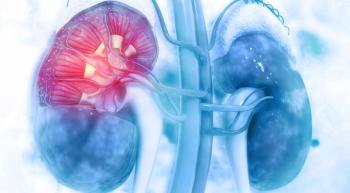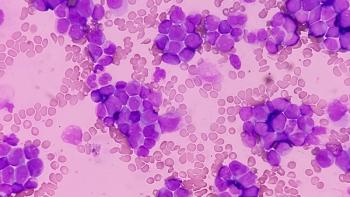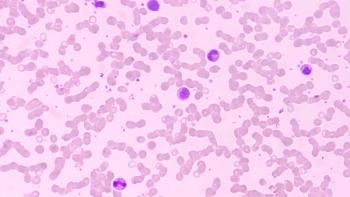
The FDA updated its safety labeling for capecitabine and 5-FU to reflect that patients with certain genetic variants risk severe or fatal toxicities.
Bridget Hoyt is the assistant editor for Oncology Nursing News. She earned her BA in communication studies at Rider University with a minor in public relations. She can be reached at bhoyt@mjhlifesciences.com.

The FDA updated its safety labeling for capecitabine and 5-FU to reflect that patients with certain genetic variants risk severe or fatal toxicities.

A look at the current state of cancer, from survival rates to federal research budgets.

The FDA approved a larger vial size of nelarabine for the treatment of pediatric and adult patients with T-ALL and T-LBL.

Updates in ovarian cancer include multiple fast track designations and breakthrough therapy status for new drugs in the clinical space.

The FDA approved subcutaneous daratumumab/VRd in patients with newly diagnosed multiple myeloma who are not eligible for ASCT. Here’s what you should know.

Plus, a phase 1 breast cancer vaccine, updated NCCN guidelines, and a combination with standard-of-care potential in triple-negative breast cancer.

When patients with RCC progress on a TKI/IO combination, advanced practice providers use patient experience to inform treatment decisions.

Margarita Huober, AGNP, AOCNP, explains that understanding a patient on an individual level leads to more informed care decisions in RCC.

Findings from a real-world, head-to-head comparison show greater colorectal cancer risk reduction and safety with the use of a GLP-1RA vs aspirin.

Look back at the top 5 updates for oncology nurses and advanced practices providers published in 2025.

The FDA has approved the use of subcutaneous amivantamab and hyaluronidase-lpuj across all amivantamab indications.

The FDA has greenlit treatment with rucaparib for previously treated patients with BRCA-mutated metastatic castration-resistant prostate cancer.

The FDA has approved niraparib and abiraterone acetate with prednisone for the treatment of patients with BRCA2-mutated metastatic hormone-sensitive prostate cancer.

Phase 2 data demonstrated similar pharmacokinetic profiles between subcutaneous azacitidine and an oral combination of azacitidine and cedazuridine.

Patients with relapsed/refractory large B-cell lymphoma treated with glofitamab or epcoritamab experienced early disease progression.

Dexamethasone reduced the severity of ICANS but did not impact the rates of ICANS or CRS in patients with LBCL receiving axi-cel.

Race was identified as an independent prognostic factor in patients with AML receiving intensive chemotherapy.

Danielle Blair, RN, BSN, OCN, CCRP, explains what her role as an adolescent and young adult nurse navigator in oncology entails.

The FDA has approved lisocabtagene maraleucel for the treatment of adult patients with relapsed or refractory marginal zone lymphoma following at least 2 prior lines of therapy.

Catch up on recent regulatory decisions by the FDA in oncology, including actions in lung, hematologic, genitourinary, and gastrointestinal cancers.

Emily Coiro, MSN, AGACNP-BC, BMTCN; and Julie Zgola, BSN, RN, who work in stem cell transplantation, were matched with patients in need of a transplant.

The FDA has approved durvalumab plus FLOT for the treatment of patients with resectable gastric or gastroesophageal junction adenocarcinoma.

Emily Shelby, MSN, FNP-C, emphasized that referrals to other specialties is key to managing heavily pretreated patients with metastatic colorectal cancer.

The FDA has approved intravenous or subcutaneous pembrolizumab combined with enfortumab vedotin-ejfv in the neoadjuvant and adjuvant MIBC settings.

Elizabeth Hubert, APRN, explains how to treat patients receiving luspatercept for low-risk myelodysplastic syndromes.

The FDA has converted its accelerated approval to a standard one for tarlatamab in extensive-stage small cell lung cancer.

The FDA has approved sevabertinib for the treatment of patients with HER2-positive nonsquamous non-small cell lung cancer.

The FDA granted standard approval to epcoritamab monotherapy and epcoritamab plus lenalidomide and rituximab for relapsed/refractory follicular lymphoma.

Here are 5 presentations that oncology APPs should know about, from patient management to practice management.

The FDA has approved a biosimilar of pertuzumab that is indicated for multiple breast cancer settings.

Published: September 25th 2025 | Updated: October 21st 2025

Published: June 23rd 2025 | Updated: June 24th 2025

Published: June 1st 2025 | Updated: June 2nd 2025

Published: May 14th 2025 | Updated: May 16th 2025

Published: April 17th 2025 | Updated: May 5th 2025

Published: March 28th 2025 | Updated: March 31st 2025